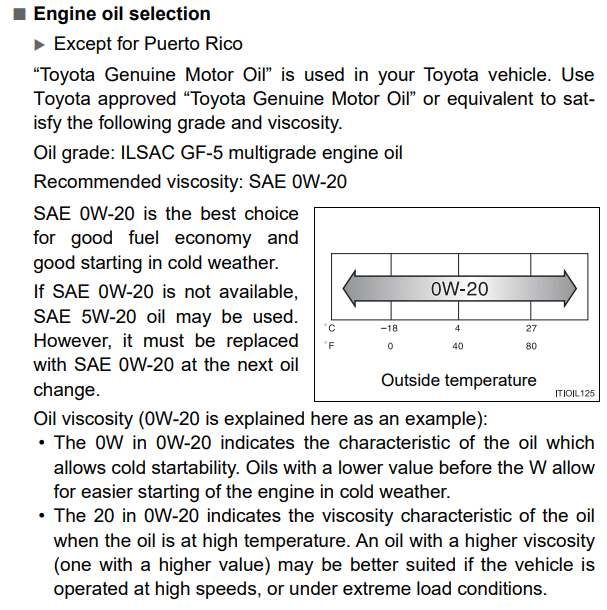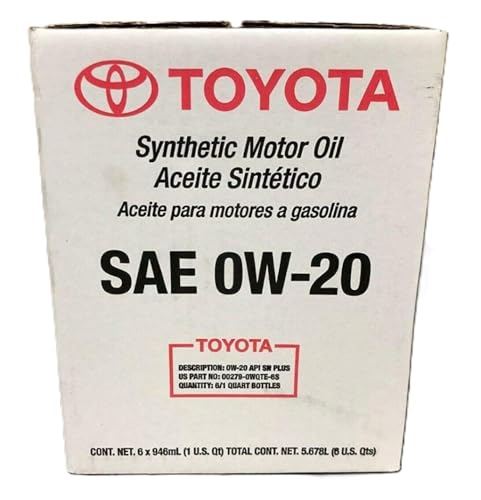One name stands strong in the sport utility vehicles: the 2019 Toyota 4Runner. This rugged SUV is not just about good looks; it’s built for some serious off-roading and is known for its durability and longevity.
Under the hood, it boasts a 4.0-liter V6 engine, pumping out 270 horsepower and 278 lb-ft of torque. Coupled with a five-speed automatic transmission, the 4Runner has ample power for both city cruising and adventurous trails.
The 2019 model offers a variety of trims, including the SR5, SR5 Premium, TRD Off-Road, TRD Off-Road Premium, TRD Pro, and Limited, each catered to different driving needs and preferences.
The lifeblood of any engine is its oil. Engine oil lubricates the intricate network of moving parts within the engine, reducing friction and helping to cool engine components. Doing so, it aids in maintaining the overall health of your engine, thereby contributing to optimal vehicle performance and prolonging the life of your vehicle.

For the 2019 Toyota 4Runner, selecting the right type of engine oil is particularly crucial, given its off-roading capabilities and the harsh conditions it’s often subjected to. Suitable engine oil will not only enhance the 4Runner’s performance but also maximize its fuel efficiency. Thus, it’s not just about picking any oil but choosing the right oil for your 2019 Toyota 4Runner.
What Kind Of Oil Does a 2019 Toyota 4Runner Take?
The 2019 Toyota 4Runner’s engine is designed to perform optimally with the Toyota-approved “Toyota Genuine Motor Oil” or an equivalent that satisfies ILSAC GF-5 multigrade engine oil. ILSAC GF-5 oils provide improved high-temperature deposit protection for pistons and turbochargers, more stringent sludge control, and seal compatibility.
Recommended Viscosity: SAE 0W-20. If not available, SAE 5W-20 may be used temporarily, but it must be replaced with SAE 0W-20 at the next oil change.

The ideal viscosity for the 2019 Toyota 4Runner is SAE 0W-20. Viscosity refers to the thickness or fluidity of the oil, which impacts its ability to flow smoothly within the engine. The ‘0W’ denotes the oil’s flow at 0 degrees Fahrenheit (cold temperature), and ’20’ indicates the thickness of the oil at normal operating temperatures. If SAE 0W-20 is not available, SAE 5W-20 may be used, but it should be replaced with SAE 0W-20 during the next oil change.
As we mentioned earlier, the viscosity of engine oil is crucial in determining how effectively the oil will lubricate the engine. The first number in the viscosity rating (the ‘0’ in ‘0W-20’) represents the oil’s flow at 0 degrees Fahrenheit, which is its winter or “W” rating. The lower this number, the less the oil thickens in cold weather, making engine start-up easier.
The second number (’20’ in ‘0W-20’) indicates the oil’s viscosity at high operating temperatures. A lower number here means that the oil is less thick at high temperatures, allowing it to flow more freely and provide better protection to the engine.
How Much Oil Does A 4.0 4runner Take?
When you’re changing the oil in your 2019 Toyota 4Runner, keep in mind that its oil capacity, including the filter, is 6.6 quarts (equivalent to 6.2 liters or 5.5 imperial quarts). This is the amount of oil you’ll need to have on hand to completely refill the engine after draining the old oil and replacing the oil filter.
Understanding Engine Oil Consumption in Your 2019 Toyota 4Runner
Oil consumption in your 2019 Toyota 4Runner may vary based on your driving conditions and habits. Certain situations can increase oil consumption in your vehicle. For instance, driving at high speeds, towing heavy objects, or driving in very hot or cold weather conditions can lead to higher oil consumption.
Moreover, more aggressive driving styles, such as frequent hard accelerations and decelerations, may also contribute to a faster oil burn rate. Additionally, older vehicles tend to consume more oil as wear and tear over time can lead to internal engine components allowing more oil to pass into the combustion chamber.
Routine checks of your 4Runner’s oil level are crucial for maintaining the longevity and performance of your vehicle. It’s recommended to check the oil level at every fuel stop.
To ensure an accurate reading, wait at least 5 minutes after turning off your warmed-up engine to allow the oil to settle down into the oil pan. Then, pull out the dipstick, wipe it clean, reinsert it fully, and pull it out again to read the level.
The oil should ideally be between the two notches on the dipstick. Regular checks will allow you to detect any sudden drops in oil level, which could indicate a leak or high oil consumption, helping you prevent potential damage to your engine.
Oil Change Interval for the 2019 Toyota 4Runner
For the 2019 Toyota 4Runner, the manufacturer recommends using SAE 0W-20 engine oil for optimum performance. If, for any reason, this grade of oil isn’t available, and SAE 5W-20 is used as a temporary replacement, it’s important to replace it with SAE 0W-20 at the next oil change.
As for frequency, Toyota generally recommends changing the engine oil and filter every 10,000 miles or 12 months, whichever comes first. However, this interval may vary based on the specific oil used, driving habits, and environmental conditions.
Several factors can affect the ideal oil change interval for your 4Runner. For instance, if you frequently drive in harsh weather conditions, engage in heavy-duty activities like towing, or often take short trips that don’t allow your engine to warm up fully, you may need to change your oil more frequently. High engine loads and extreme temperatures can break down oil faster, reducing its effectiveness.
Keeping up with your 4Runner’s regular maintenance schedule is key to ensuring its longevity and optimum performance. Regular oil changes help to reduce engine wear, improve fuel efficiency, and maintain engine cleanliness. Over time, oil can accumulate dirt and debris, which can lead to increased friction and wear on engine parts.
Regular oil changes ensure that your engine is always lubricated with clean oil, helping to prevent these issues. Always refer to your 4Runner’s owner’s manual for the most accurate information regarding maintenance schedules and procedures.
Best Motor Oil For The 2019 Toyota 4Runner
For the 2019 Toyota 4Runner, the manufacturer recommends Toyota-approved “Toyota Genuine Motor Oil” or an equivalent that satisfies the ILSAC GF-5 multigrade engine oil standard. The recommended viscosity is SAE 0W-20.
- GENUINE OIL: Toyota factory-approved synthetic motor oil specifically formulated for optimal performance in Toyota gasoline engines
- VISCOSITY GRADE: SAE 0W-20 weight oil provides excellent cold-start protection and maintains proper viscosity at operating temperatures
- PACKAGE CONTENTS: Case contains six (6) individual 1-quart bottles, totaling 6 quarts (5.678L) of synthetic motor oil
- COMPATIBILITY: Engineered for Toyota vehicles requiring 0W-20 grade oil and meets API SN Plus service classification standards
Choosing the right motor oil for your vehicle ensures good fuel economy and easy starting in cold weather. It also provides the correct lubrication to minimize wear and tear on the engine’s internal components, thereby enhancing its performance and longevity.
If the specific Toyota Genuine Motor Oil is not available, you may use other reputable brands as long as they meet the ILSAC GF-5 specification and the correct viscosity (SAE 0W-20). Some of these alternatives could be Mobil 1 Advanced Fuel Economy Full Synthetic Motor Oil 0W-20, Castrol EDGE Advanced Full Synthetic 0W-20, or Valvoline Advanced Full Synthetic SAE 0W-20 Motor Oil.
Remember, while SAE 5W-20 oil may be used in a pinch, it should be replaced with the recommended SAE 0W-20 oil at the next oil change.
Always ensure to check the vehicle’s owner’s manual for the most accurate information about the recommended engine oil.
Last update on 2026-01-30 / Affiliate links / Images from Amazon Product Advertising API




















